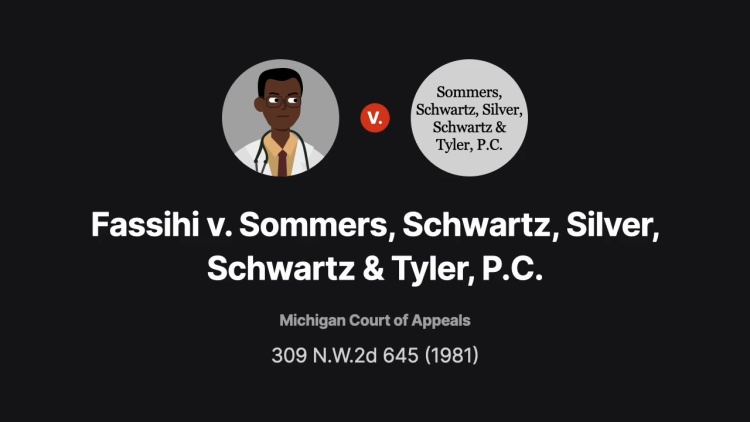Fassihi v. Sommers, Schwartz, Silver, Schwartz and Tyler, P.C.
Michigan Court of Appeals
309 N.W.2d 645 (1981)
- Written by Craig Conway, LLM
Facts
Dr. Fassihi, a radiologist, (plaintiff), was a 50 percent shareholder, officer, and board member in Livonia Physicians X-ray. P.C. (Livonia), a company formed with fellow physician Dr. Rudolfo Lopez who owned the other 50 percent. As a result of his involvement with Livonia, Fassihi obtained medical staff privileges at a nearby hospital. The hospital had an agreement with Livonia for the company to exclusively provide radiology services. After about 18 months of working with Fassihi, Dr. Lopez consulted with Livonia’s counsel, Sommers, Schwartz, Silver, Schwartz and Tyler, P.C. (Sommers) (defendant), regarding how Fassihi could be ousted from the company. Concurrently, Sommers represented Lopez personally in some legal matters. Donald Epstein, a Sommers attorney, notified Fassihi by letter that he had been terminated from Livonia. As a result, Fassihi lost his medical staff privileges at the hospital. Fassihi filed suit against Sommers for breach of attorney-client relationship, breach of fiduciary, legal, and ethical duties, fraud, and legal malpractice. The trial court denied Sommers’ motion for summary judgment and also denied Fassihi’s motion to compel discovery of information from Epstein and Sommers, which it refused to provide based on the attorney-client privilege. Each party filed an interlocutory appeal of the trial court’s order.
Rule of Law
Issue
Holding and Reasoning (Per curiam.)
What to do next…
Here's why 907,000 law students have relied on our case briefs:
- Written by law professors and practitioners, not other law students. 47,100 briefs, keyed to 996 casebooks. Top-notch customer support.
- The right amount of information, includes the facts, issues, rule of law, holding and reasoning, and any concurrences and dissents.
- Access in your classes, works on your mobile and tablet. Massive library of related video lessons and high quality multiple-choice questions.
- Easy to use, uniform format for every case brief. Written in plain English, not in legalese. Our briefs summarize and simplify; they don’t just repeat the court’s language.






